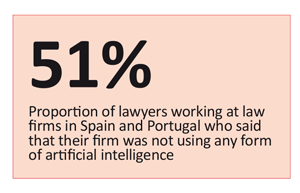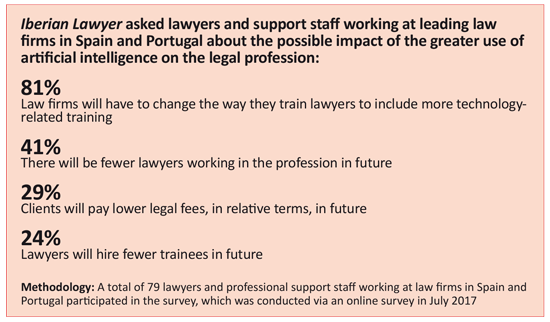Robots could make it harder for young lawyers to access legal profession
Artificial intelligence will enable firms to improve efficiency, profitability and client service, say its advocates, but others fear the number of practicing lawyers will decrease as a result
The vast majority of lawyers at law firms in Iberia support the greater use of artificial intelligence (AI) because they believe it will make their firm more efficient and able to provide a better service to clients, new Iberian Lawyer research shows.
However, there are also widespread reservations about the greater use of AI, with some arguing its bad news for lawyers, particularly aspiring ones. Indeed, the majority of lawyers at Spanish and Portuguese law firms believe AI will lead to a reduction of at least 15 per cent in the number of lawyers.
There seems to be little doubt that law firms need to make more of an effort to utilise AI. A total of 85 per cent of respondents to our survey said they thought their firm should make greater use of AI, a trend that some are describing as the ‘robotization’ of the legal profession. Supporters of AI see it as a means of improving efficiency and profitability as well as improving the service provided to clients. Meanwhile, two-thirds (66 per cent) of those surveyed agreed that AI will make legal work “more rewarding by enabling lawyers to concentrate on more interesting tasks”. One survey participant remarked: “AI is good for repetitive tasks and automatic research.”
Benefits for clients
The use of AI will also have benefits for clients, the research suggests. More than half (55 per cent) of those surveyed said it would mean firms could respond to clients´ needs more quickly, while one in three (34 per cent) said it will enable firms to provide better advice to clients. In addition, one-fifth of those surveyed said it will allow firms to charge clients lower fees, while 30 per cent said it would enable firms to “take on more work and more clients”. One study participant remarked that AI is “positive for clients, but negative for any lawyers who are unable to adapt”.
Despite the commonly acknowledged benefits of AI, its use by law firms is not widespread. The majority of participants in the survey (51 per cent) said their firm was not currently using any form of AI, though 40 per cent said their firm was, whether that was for reviewing contracts, analysing legal documents, scanning documents, reviewing previous cases, or predicting the outcome of cases.
However, around one in six lawyers are not completely sold on the idea of using AI. A total of 15 per cent thought their firm should not make greater use of it – of these, the majority said they thought AI was not “completely reliable”. Meanwhile, a third of this group agreed that the law is “fundamentally about people and human relationships, artificial intelligence can never replace people”. Furthermore, 17 per cent of those objecting to the use of AI argued that “humans perform the relevant tasks better than computers could”.
 New training needed
New training needed
The increased use of AI by law firms will have a far-reaching effect on the profession – including training, access to the profession, and fees – the survey suggests. Eight out of ten respondents said that AI would mean that law firms will have to change the way they train lawyers to include more technology-related training. “In the near future, lawyers specialised in interpreting and managing legal data produced by computers for the purpose of preparing legal documents will emerge,” said one study participant. Another concern among some lawyers is that, as junior lawyers start to develop their skills by doing standard legal tasks – such as due diligence – there will be fewer opportunities for them to train as the use of AI increases.
Meanwhile, 29 per cent said clients will pay lower legal fees, in relative terms, in future as a result of AI. One in four survey participants said AI will lead to firms hiring fewer trainees.
Lawyer remuneration will also be impacted by AI, according to around one in four respondents. However, while 13 per cent think it will result in lawyers being better paid, 11 per cent argued that it will result in lawyers being paid less. Looking on the bright side for law firms, 11 per cent of respondents said they thought AI would lead to clients paying higher fees, relatively speaking, in future.
A significant proportion of respondents (41 per cent) said they believed there would be fewer lawyers working in the legal profession. The extent to which members of this group believe the numbers will drop varies. Around half of those who think there will be fewer lawyers in the profession in future expect the numbers to decrease by between 15-30 per cent. However, 40 per cent of this group anticipate the amount of lawyers in the profession will reduce by less than 15 per cent.
Graduate worries
Perhaps most worrying for the law graduates of the future is that one respondent said they thought the increased use of AI in the legal profession would mean there would be more than 50 per cent fewer lawyers. What options might there be for law graduates struggling to access the profession in future? The survey suggests that short-term contract-based work might be one – 12 per cent of survey respondents said the number of lawyers entering the profession who have to accept such work will increase. “Fewer positions available in the legal profession means AI is negative for lawyers,” said one study participant.
With regard to the impact on law firms, it is to be expected that AI will result in new types of players entering the legal market. A significant majority (79 per cent) of respondents said they envisaged the emergence of new, more tech-savvy legal service providers that will challenge traditional law firms.
Though the survey suggests that law graduates may find it harder to access the legal profession in future, there is some cause for them to be optimistic. Eight out of ten lawyers agreed that the greater use of AI will give younger, more tech-savvy lawyers an advantage over older generations of lawyers. “Artificial intelligence will complement lawyers, it will not be a substitute for them, lawyers will always be necessary,” said one survey participant.












